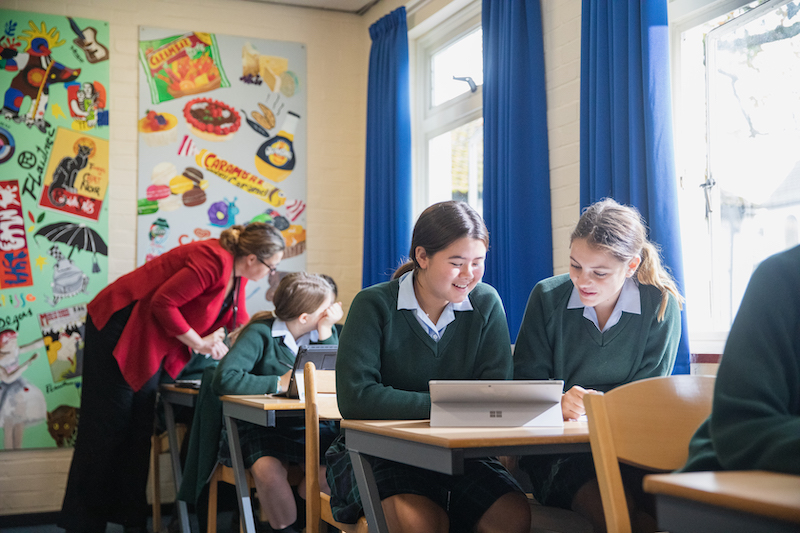Taking charge of your learning – the path to independent learning
Posted on 22nd Nov 2022 in Which School?, Curriculum, School News
Mr Matthew Godfrey, Deputy Head of Downe House, on how to help inspire a more independent approach to learning.
Independent learning is often seen as the holy grail of education. For a teacher, it is hugely rewarding when a pupil takes the initiative to read or research beyond the curriculum simply because they feel motivated to do so. But school life is busy, and pupils cannot always prioritise learning for learning’s sake.
It is a common misconception that independent learning is simply working on your own without any supervision. It does not necessarily mean less teacher guidance and it certainly does not mean using technology without a clear sense of focus and direction; rather, it means receiving specific, smart guidance with independence as an end-goal.
So, what encourages independent learning? Downe House School’s pupils and teachers provide an insightful, first-hand point of view on how to become an independent learner.
Two Sixth Formers – both called Louisa – felt that at GCSE, there is so much material to get through that there isn’t the time or opportunity to look beyond the academic curriculum. Louisa A, who is going on to study English Literature, Biology and Chemistry at A Level and hopes to progress on to medical school, said: “GCSEs helped me with self-discipline and being able to prioritise. But those skills are pretty much taken for granted at A Level: now we can take charge of our own learning with the bonus that we have selected subjects we want to study.”
Louisa B, who is taking A Levels in German, Spanish and English Literature, pointed out that the ability to critique yourself is a key part of being an independent learner. “I feel I am getting better at assessing my own progress. But this is, in part, a result of a genuine desire to learn more.”
This desire is fuelled by focusing on subjects that are of genuine interest. A strong teacher-pupil relationship is also key. It was clear, too, how important other aspects of school life were to both pupils in their journeys towards independent learning.
“When I was younger, I identified role models in the years above me. I remember listening to the Global Ambassadors talking about current events during assemblies and thinking that I would like to do that one day,” said Louisa B.
Louisa A added: “It helps younger girls to see behaviour modelled by the older pupils. There is a culture of academic aspiration in the school. There are many Sixth Form girls in leadership positions and running school societies, and I think that does inspire younger girls to aim high and get involved.”
Sophia, a Lower Fifth (Year 10) pupil, talked about the academic mentoring scheme within the boarding houses at Downe House. “It’s a good idea because you get to talk to older students and to see how you can develop as a student and a person. My mentor is in the Lower Sixth (Year 12) and she helps me by explaining things and sharing some of the notes she made when she was my age.”
Sophia touched on how older pupils can help with another important element of independent learning – metacognition. “Talking to other pupils about how they learn best helps me to understand how my own mind works and how I can improve the way I learn.”
Isadora, a Lower Fifth (Year 10) pupil and an academic scholar, said that she enjoyed taking part in extracurricular activities, such as the Downe House Elective Programme because it enabled her to explore areas outside the curriculum. “It was really interesting! I loved Mr Breeze’s course on ‘The Power of China’. I don’t think it really counts as independent learning because I wasn’t really directing the learning myself, but it broadened my knowledge and mind.”
Dr Andy Atherton, English teacher and Director of Research and Academic Enrichment at Downe House, explained how the Elective Programme has helped to enhance the academic spirit of the school. “The Electives are an opportunity for our teachers to model their own academic interests and enthusiasms outside the conventional classroom. Our pupils get to witness how animated they are by their subjects - and this is infectious. Listening to Mrs Henson talking about how mathematics has helped us to navigate the globe, or to Dr Jones as he explains the chemistry behind everyday objects is eye-opening for the girls. It’s very important for our pupils to see that learning isn’t just for exams – it’s an enjoyable, lifelong process that provides ongoing intellectual nourishment.”
Ms Maria Reichardt, Head of Academic Scholars and a Teacher of French at Downe House, said that the school’s super-curricular programme, which includes a wide range of teacher-led and pupil-led societies and activities, helps the girls to see how they can become better versions of themselves: “These opportunities help them to see intellectual endeavours in a similar light to physical ones: if you want to run a marathon, you don’t do it straight away; rather, you work at it gradually and improve over time.”
This article first appeared in the 2023 edition of Which School? You can view the digital version of the guidebook here: